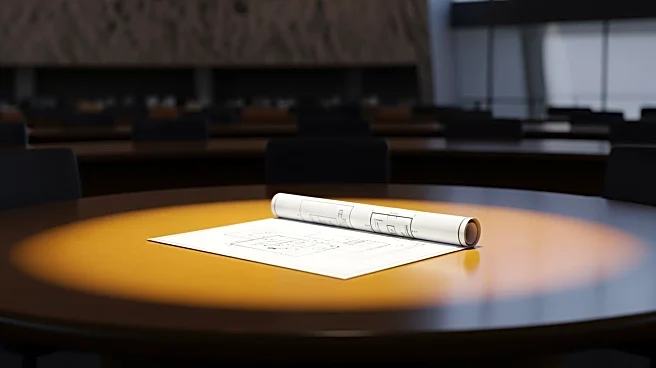What's Happening?
The United Nations Security Council has approved President Trump's plan for the future of Gaza, which includes the establishment of a transitional authority known as the 'Board of Peace' and an international
stabilization force to provide security and oversee demilitarization. The resolution, passed with a 13-0 vote, aims to support Gaza's reconstruction and outlines a potential pathway to Palestinian self-determination and statehood, contingent upon reforms by the Palestinian Authority. The plan has faced opposition from Hamas and concerns from international stakeholders regarding its lack of a clear timeline for Palestinian independence.
Why It's Important?
The resolution represents a pivotal moment in international efforts to address the aftermath of the Israel-Hamas conflict and stabilize Gaza. By securing UN backing, the plan seeks to legitimize international involvement in Gaza's governance and security, potentially facilitating peace and reconstruction. The initiative could influence regional dynamics and U.S. foreign policy, impacting relations with Middle Eastern countries and shaping the broader peace process. However, the absence of a definitive timeline for Palestinian statehood raises questions about the plan's long-term viability and its implications for Palestinian sovereignty.
What's Next?
The resolution authorizes the Board of Peace and stabilization force until the end of 2027, with further details on implementation expected soon. The U.S. plans to initiate dialogue between Israel and the Palestinians to establish a political framework for coexistence. The resolution's passage may prompt varied responses from stakeholders, including Israel, Hamas, and international organizations, as they assess the plan's impact on regional stability and peace efforts. The success of the initiative will depend on the cooperation of involved parties and the effective execution of outlined reforms and security measures.
Beyond the Headlines
The resolution's endorsement of a pathway to Palestinian statehood, albeit without a clear timeline, underscores ongoing debates about Palestinian sovereignty and self-determination. The plan's focus on demilitarization and reconstruction reflects broader geopolitical interests in stabilizing the region. Ethical considerations arise from the potential impact on Gaza's civilian population and the role of international forces in local governance. The resolution's implementation could set precedents for future international interventions in conflict zones, influencing global diplomatic strategies.









